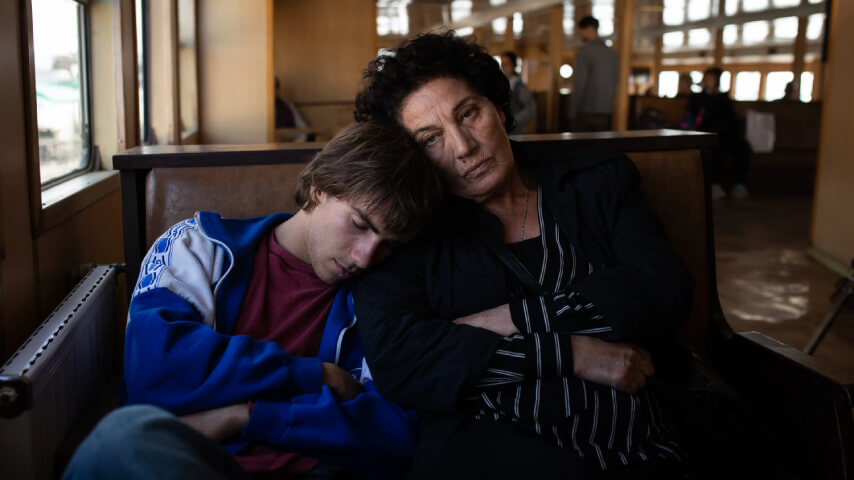An unlikely duo’s rambling trip becomes a tapestry of Istanbul in Crossing
Those living on the fringes of Istanbul are given the spotlight in Swedish filmmaker Levan Akin’s fourth feature, Crossing.
Photo: Mubi
Crossing, the fourth feature film from Swedish filmmaker Levan Akin (And Then We Danced), opens with white serif text that reads: “Both Georgian and Turkish are gender-neutral languages: they make no distinction of grammatical gender.” This linguistic factoid becomes instantly relevant as the film focuses on one Georgian woman’s exhaustive search for the estranged trans relative she believes is now living in neighboring Istanbul. As is intriguingly common throughout much of the world, English (another language that’s considered largely gender-neutral) becomes the lingua franca that bridges the barrier between Georgian and Turkish. Yet as Crossing’s plot unfolds, it becomes clear that verbal semantics only go so far; respect manifests through actions as much as words, especially amid the absence of a common tongue.
“It seems Istanbul is a place where people come to disappear,” says Lia (Mzia Arabuli), a retired Georgian schoolteacher who finds herself in the Turkish metropolis as a last-ditch effort to locate her niece, who she hears is now going by the name Tekla. Achi (Lucas Kankava), her much-younger neighbor-turned-escort, relates to this statement all too well; years ago, his mother left their hometown of Batumi to seek work in Istanbul and never returned. As the duo weave their way through the cityscape—chasing whatever meager leads land in their laps—they come to view Istanbul through the eyes of some of its most vulnerable, but always dignified, citizens: young panhandlers, sex workers, immigrants, “pirate” cab drivers, and the grassroots activists who defend their collective rights from slumlords, corrupt cops, and a system that views these inhabitants as disposable.
Though many of the characters surveyed in Crossing face intense hardship—homelessness, addiction, food insecurity—Akin’s primary interest lies in highlighting moments of kindness, even if they are fleeting by nature. While Lia and Achi regularly find themselves in contention (a product of their staggering difference in age and personality), they always ensure that the other is fed and taken care of, even if they are temporarily living like vagabonds on a limited supply of cash. Gifted pistachio baklava is tenderly wrapped in napkins, a stray apple is carefully hand-sliced and tomatoes are ransacked from neighboring gardens all to ensure that the other’s stomach isn’t rumbling, even if they’re actively feuding.
Eventually, the duo’s storyline intersects with the advocacy of Evrim (Deniz Dumanl), a local trans woman who has recently completed her law degree and now aims to help her community. Her professional savviness coupled with her personal experience navigating Turkish law enforcement make her an obvious thorn in the side of lazy, incompetent officers. (“So much for a peaceful lunch!” one such lawman exclaims when Evrim arrives at the station to advocate for the release of an unhoused child.) It isn’t until Lia and Achi encounter Evrim that they’re truly able to navigate the trans spaces of Istanbul, though even a local member of this community can’t promise a satisfying ending to their border-spanning search for Tekla.
Some may find Crossing to get its own narrative strings crossed for the sake of Akin’s meandering interest in weaving a tapestry of varied ways of life in Istanbul. Aside from Lia and Achi’s quest, the film lingers on intimate moments in Evrim’s personal life (from fiery hook-ups to party hopping to lawyerly duties) as well as scenes involving two street-dwelling children who strum a saz and sing folk songs for spare change. While these interactions might have virtually nothing to do with the protagonists’ own journey, they do afford the viewer a glimpse of Istanbul’s underbelly that the film’s two central tourists couldn’t possibly interact with on more than a cursory level. Cinematographer Lisabi Fridell’s handheld camera is also perfectly suited to capture the raw realism of the trip, whether by land (via bumpy bus), sea (via commuter ferry) or foot (via hoofing the winding streets of the historic city). While Akin might not have any personal ties to Turkey (converse to his Georgian ancestry), the gaze that he employs is inquisitive and communicated with the utmost respect for the myriad people (and well-loved stray cats) that coexist here together.
Perhaps a bit predictably, Crossing emphasizes the importance of forging new connections rather than holding onto relationships that may no longer serve us. However, its dramatic conclusion still manages to forgo cliched expectations and cater instead to the limitless possibilities that abound in an urban sprawl. It certainly helps that Arabuli and Kankava’s chemistry is electric, harkening back to films like Harold And Maude, Everything Is Illuminated and Little Miss Sunshine simultaneously. Though the final product possesses a rambling, roving tendency, you’ve got to admit that it’s perfectly pleasant to get lost in an unfamiliar land every now and again.
Director: Levan Akin
Writer: Levan Akin
Starring: Mzia Arabuli, Lucas Kankava,Deniz Dumanlı
Release Date: July 19, 2024